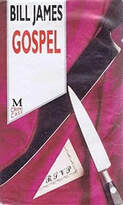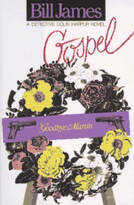
Instead, knockout entries like Halo Parade (1987) and Protection (1988) make the best introductions to James’s demimonde of cops and criminals. It is true that the chronological reader will find ripples and resonances as recurring characters emerge and collide (or collude) with one another, bringing their baggage and their prior crimes with them. And yet there is a deep satisfaction in following a single self-contained narrative when Bill James is at the top of his game.
My current read, the funerals-and-fêtes tragicomedy Gospel (1992) is a brilliant showcase of the author’s strengths as a storyteller and observer of often crooked, contradictory human nature; it is also a title that can easily stand on its own merits outside of the series. The story begins with a familiar tableau: Harpur and his colleagues wait on a side street outside a bank. Suave art dealer and protected “supergrass” Jack Lamb informed Harpur that the building is the rumored target for a robbery, and right on schedule the doomed criminals arrive.
In the ensuing chaos, Harpur kills Martin Webb, a gangster with good looks but a low I.Q. who takes aim at an unarmed cop. Martin is/was the dim but beloved son of Doug Webb, the volatile head of a second-string crime family. Unsure exactly who killed Martin, Doug sets his vengeful sights on the informants whom he thinks tipped off the police. He becomes obsessed with two targets: Jack Lamb and a college student named Denise Prior, who has befriended Lamb’s equally youthful wife. Denise is also, not quite coincidentally, carrying on an intense affair with the married Colin Harpur.
The joy of each new story lies in seeing how Bill James will shift around and shake up his kaleidoscope of characters. The result is certain familiar terrain traveled expertly – such as the robbery and stakeout or the uneasy alliance of criminals wary of each other but bonding over a shared goal – while the road (i.e., the plotline) offers its share of detours and surprises. James is one of those authors whom I find compulsively readable. He imbues nearly every one of his creations with so much personality and wiseacre, deadpan poetry that I find myself oddly wishing that amoral cops and status-seeking career criminals showed this much wit and winking humor in reality.
Indeed, Gospel offers the largest role to date for one of the series’ most interesting incidental characters. The very successful and largely unflappable art dealer Jack Lamb is a perfect fit within the Harpur & Iles world: he knows how to walk the line between legitimate businessman and back-of-the-van, high-end fence with aplomb, and he knows that Harpur will always look the other way as long as he proves his worth as a confidential informant. It is because of his tony outdoor fête, whose enviable guest list includes no less a dignitary than the Queen’s Lord Lieutenant, that Lamb must find a novel way to temporarily dispose of an uninvited corpse until the festivities are over and he can remove it from his property.

Full of plot twists and wry dialogue while offering an engaging psychological study of every character placed under the microscope, Gospel is the ninth Harpur & Iles book and one of the strongest entries to date. The fact that, like most of the titles, it can be enjoyed on its own and still provides a wild ride is testament to the talents of the prolific (and now 93-year-old) Welsh author Bill James, whose 36th Colin Harpur novel (Low Pastures) was published this year. And that means I’ve got at least 27 more books to go, a rewarding road I fully intend to travel.
 RSS Feed
RSS Feed